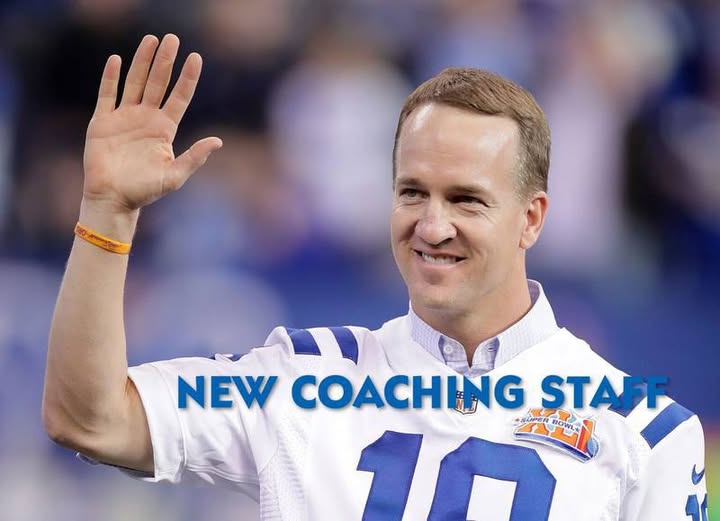The Best News We Could Ask For Is This: Peyton Williams Manning, Famously Nicknamed “The Sheriff,” Spent Eighteen Incredible Seasons as a Quarterback in the National Football League
The best news we could ask for is this: Peyton Williams Manning, famously nicknamed “The Sheriff,” spent eighteen incredible seasons as a quarterback in the National Football League (NFL), and in that time, he not only redefined what it meant to play the position but also cemented his legacy as one of the greatest players in the history of the sport. From his precision passing to his unrivaled football IQ, Manning’s career was nothing short of legendary. For fans, players, and coaches alike, his time on the field was a masterclass in excellence, perseverance, and leadership.
Born on March 24, 1976, in New Orleans, Louisiana, Peyton Manning came from a football family. His father, Archie Manning, was an NFL quarterback, and his younger brother, Eli Manning, would later follow in his footsteps to achieve great success in the league as well. But even with such a pedigree, Peyton’s journey to the top was uniquely his own. At the University of Tennessee, he honed his skills and developed into one of the most polished quarterback prospects in history. When the 1998 NFL Draft arrived, there was little doubt about who would go number one overall. The Indianapolis Colts made Manning the top pick, and with that decision, the franchise changed forever.
Peyton’s impact on the Colts was immediate. Though his rookie season was filled with growing pains, including a league-high 28 interceptions, it was evident that something special was brewing in Indianapolis. Manning’s tireless work ethic, attention to detail, and unrelenting desire to improve laid the foundation for one of the most dominant quarterback careers the NFL has ever seen. Under his leadership, the Colts transformed from perennial underachievers into consistent contenders. Over the course of 13 seasons with Indianapolis, he led the team to multiple division titles, playoff appearances, and, most notably, a Super Bowl championship in the 2006 season—Super Bowl XLI.
That victory was a defining moment not just for Manning, but for the entire Colts organization. In a rain-soaked game in Miami, Manning outdueled the Chicago Bears and finally silenced critics who questioned his ability to win the big one. He was named Super Bowl MVP, and the victory validated years of hard work and perseverance. But for Peyton, it wasn’t just about winning. It was about the process—the preparation, the strategy, the countless hours in the film room. Nicknamed “The Sheriff” for his commanding presence at the line of scrimmage and unmatched control of the offense, Manning’s ability to read defenses and adjust plays on the fly became the stuff of legend.
His signature cadence—“Omaha! Omaha!”—became a cultural phenomenon, and his pre-snap reads were so advanced that defenders often felt like they were playing chess against a grandmaster. Manning’s mind for the game was as sharp as any coach, and many believed he could have stepped into a coordinator’s role while still wearing pads. But what set Manning apart wasn’t just his intelligence; it was his physical precision. His throws were timed perfectly, placed with pinpoint accuracy, and delivered with consistency rarely seen in the sport. He wasn’t known for a cannon arm or breakaway speed—his greatness came from mastering the fundamentals and executing them better than anyone else.
The stats speak for themselves. When Manning left the Colts after the 2011 season, he had shattered numerous franchise and league records. He had become the NFL’s all-time leader in passing touchdowns and passing yards, earned four league MVP awards (a number that would later become five), and posted countless 4,000-yard seasons. His tenure with Indianapolis came to an emotional end due to a serious neck injury that required multiple surgeries. Many wondered if he would ever play again. But in true Peyton fashion, he returned—stronger, smarter, and more determined than ever.
In 2012, Manning signed with the Denver Broncos, and in doing so, embarked on a remarkable second act to his already storied career. If his time in Indianapolis was about proving he could be a franchise savior, his years in Denver were about showing he could rise from adversity and still dominate. Over the next four seasons, Manning led the Broncos to two Super Bowl appearances and continued to set the standard for quarterback excellence. His 2013 season was historic—throwing for 5,477 yards and 55 touchdowns, both of which were NFL records at the time.
That year, he won his fifth and final MVP award and solidified his status as one of the most prolific passers the game has ever seen. Though Denver ultimately lost Super Bowl XLVIII to the Seattle Seahawks, Manning’s legacy remained untarnished. Two years later, he got the storybook ending his career deserved. In Super Bowl 50, the Broncos defeated the Carolina Panthers, giving Peyton his second championship ring. It wasn’t his flashiest performance, but it was the perfect send-off. He retired shortly thereafter, walking away from the game at the top, just as legends should.
Beyond the numbers and the rings, what truly defines Peyton Manning’s career is his influence on the quarterback position and the game itself. He helped usher in a new era where quarterbacks became more than just arm talent—they became field generals, decision-makers, and extensions of the coaching staff. Manning’s pre-snap orchestration, film study habits, and meticulous preparation changed how the position was taught and played. Young quarterbacks entering the league studied his game the way musicians study Mozart. He wasn’t just playing football; he was composing it.
His leadership extended far beyond the field. Teammates revered him, coaches trusted him implicitly, and opponents respected him deeply. He was a model professional, a fierce competitor, and an ambassador for the sport. Off the field, he became a beloved figure in commercials, charitable work, and the media. The Peyton Manning Children’s Hospital at St. Vincent in Indianapolis and his various foundations and outreach efforts have impacted countless lives. He used his platform not just for personal gain but for the greater good—a true hallmark of greatness.
Even in retirement, Manning remains a towering figure in football culture. Whether it’s through his popular show “Peyton’s Places,” his appearances on ESPN’s “ManningCast” with his brother Eli, or his involvement in NFL events, he continues to educate, entertain, and inspire fans around the world. There is even ongoing speculation about a future in coaching or ownership—a testament to his enduring football mind and the respect he commands across the league.
In 2021, Manning was inducted into the Pro Football Hall of Fame, a fitting recognition for a career that spanned nearly two decades and elevated the sport at every turn. His speech, like his play, was thoughtful, gracious, and focused on the future of football. It was a reminder that while his playing days may be over, his impact is everlasting.
In reflecting on Peyton Manning’s incredible journey, it’s hard not to be struck by the sheer breadth of his accomplishments. He retired as the NFL’s all-time leader in multiple categories, played in four Super Bowls, won two of them, earned five MVP awards, and revolutionized the quarterback position. But perhaps most importantly, he did it all with integrity, humility, and a relentless pursuit of greatness.
The best news we could ask for is that we got to witness Peyton Manning’s career unfold in real time. We got to see the precision passes, the audible mastery, the sideline leadership, and the iconic moments that defined an era. We got to learn from a player who exemplified what it meant to be a professional, a teammate, and a champion. And while the NFL moves on, as it always does, the echoes of Manning’s voice at the line of scrimmage, the image of him hoisting the Lombardi Trophy, and the lessons he left behind will endure forever.
In a league built on toughness, brilliance, and heart, few embodied all three quite like Peyton Manning. His career wasn’t just incredible—it was iconic. And for that, football fans everywhere will forever be grateful.



